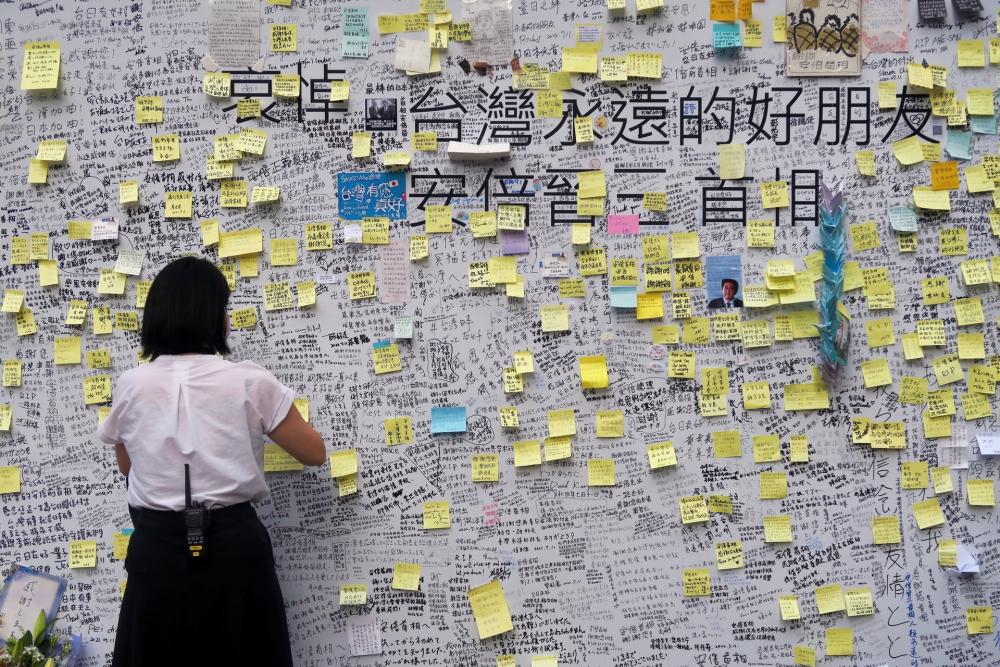The legacy of Shinzo Abe: After Japan grieves, how will his leadership be judged?


Shinzo Abe was a visionary who knew the meaning of service to his country. He also walked the talk by putting his ideas into practice. However, he was a polarising figure with many challenges and was not always successful in everything he pledged. While he had many devoted supporters, others disagreed vehemently with his vision for Japan. In any case, he will never be able to fulfil what he had striven for as, with his shooting, his life was taken so suddenly and unfairly on July 8th, 2022, in broad daylight in front of so many people during campaigning for the upcoming upper house elections. Two weeks later, the nation is still suffering from a profound sense of loss as it struggles to get its collective head around this senseless killing. His assassination was not even politically motivated – it stemmed from the unfounded personal grudge of a socially and economically deprived man. Mourning for influential leaders, such as Abe, adds a different layer to grief as it is as much collective as it is individual. It will take a long time for the populace to come to terms with his assassination.
Born and bred into a political family in 1954, Abe was the longest-serving prime minister in Japan. When he first became the prime minister in 2006, at the age of 52, he was also the youngest and the first prime minister to be born after World War II. His first premiership lasted only a year due to ill health, but when he returned in 2012, he was ready to implement bold policies internally and externally. His determination can be seen in a speech he gave during his visit to the US in February 2013, when he proclaimed that “Japan is back.” He emphasised the importance of strengthening diplomacy and trade with other nations, enhancing national security and revitalising the stagnant domestic economy. Until he resigned in September 2020, he was proactive in his endeavour to realise these goals, which are now his legacy.
The political legacy of Shinzo Abe
Abe’s economic policies, dubbed ‘Abenomics’ with the ‘three arrows’ of flexible fiscal policy, monetary expansion and structural reforms, are perhaps the most famous legacy that people remember. Despite the initial hype, however, Abenomics has not created an inclusive and sustainable economy. The same goes for his plan for gender equality. Although he upheld ‘Womanomics,’ which advocated that female economic progress was essential for improving the economy, gender equality still has a long way to go. He did, however, at least create the opportunity to discuss such an important issue.
Strengthening Japan’s global position
Abe’s other legacy includes his diplomatic skills and his presence as one of the world leaders. As soon as he became a prime minister, he started energetically visiting many countries and strengthening Japan’s political and economic ties with not only the US, Japan’s treaty partner, but also the UK, India, Australia and other Asian and African nations. His contribution to reviving the Trans-Pacific Partnership after the US withdrawal is an excellent example of him playing the leading role in creating a global economic power. Undoubtedly, Abe enhanced and consolidated Japan’s global position as it is today.
The controversies at home and abroad
Of course, it was not all sunshine and roses, as some of Abe’s words and deeds caused a stir both at home and abroad. For example, his visits to the Yasukuni Shrine, which enshrines Japanese soldiers who died for their country, including Class-A war criminals of WWII, and his desire to revise the pacifist constitution, especially Article 9, which renounces war. Both have deep links with Japanese imperial and colonial legacies in Asia and the Pacific, encompassing difficult and complex issues. He limited the number of visits to Yasukuni when he was a prime minister, but he did not give up on it altogether, insisting that his intention was not to worship the war criminals nor glorify the Japanese imperial past. There is no simple solution for resolving the impasse of imperial and colonial legacies between Japan and other East Asian countries because, besides the past itself, many things get in the way, such as identity politics, memories, collective and individual trauma, emotions and, of course, the media. However, the fact remains that this is one of the most important tasks Japan has to continue.
Japan’s constitutional revision of Article 9
Another divisive issue, the constitutional revision, was perhaps Abe’s most significant legacy. He believed revising Article 9 was essential for Japan’s national security against the rise of North Korea and China, as well as the recent Russian invasion of Ukraine. He emphasised that Japan needed to be self-sufficient by having a proper military rather than maintaining the status quo with the self-defense force, which heavily relies on allies. Though he managed to expand the interpretation of Article 9, the constitutional revision was his life-long mission. Historically speaking, when the US created the constitution during the Allied Occupation in 1947, it might have made sense to emasculate Japan militarily because the aim was to democratise and demilitarise Japan so that it would never become a threat. However, it is also true that it was not meant to stay as it was indefinitely especially given that it was hurriedly drafted within a week. At the time, both the Japanese and the Americans thought that they could change it later if necessary. However, it has never been revised since 1947 as nothing is as simple due to Article 96, which stipulates a two-stage process (two-thirds of lawmakers’ approval followed by a national referendum). Abe wanted to lower the first stage from two-thirds to a half to make it easier. The reformists are likely to continue with this aim.
The legacy of his leadership
Overall, I don’t believe Abe was an apologist for Japanese imperialism or a jingoistic nationalist – he knew how to ‘play the game’ globally and was liked and respected by many world leaders, as can be seen from their heartfelt obituaries and condolences. Aside from his professional skills, he had a good sense of humour, which helped build a good relationship with other countries. For better or worse, Abe was a strong leader with a clear vision and stood his ground, and elevated Japan’s global status. It will be challenging for the LDP to fill the political and diplomatic void and address the many issues arising from Abe’s assassination. Democracy, for one – Japan never earned it itself as it was given by the US after WWII. Japan should seize this opportunity and start a meaningful dialogue about the principle of democracy. If the constitutional revision takes place, a referendum is a necessity, and so the populace needs to be ready to participate fully in democracy.
Perhaps, it is too soon to evaluate Abe’s legacy. His motto was, “if you are appreciated 50 years later, that is all that matters.” Also, when asked about the legacy he left behind on August 8th, 2008, his reply was that “the populace and history will judge me”. While it is impossible to speculate how people and history will assess Abe in 50 years’ time, one can only hope that Japan will be more politically and democratically mature, allowing an objective discussion of the merits and demerits of his legacy.
About the Author
Satona Suzuki is a lecturer in Japanese and Modern Japanese History, Department of East Asian Languages and Cultures (EALC)

![He [Abe] believed revising Article 9 was essential for Japan’s national security against the rise of North Korea and China"](/sites/default/files/styles/uncropped_medium/public/2022-06/thomas-evans-pTFB6-l0OpU-unsplash.jpg?itok=EqwN4FrL)